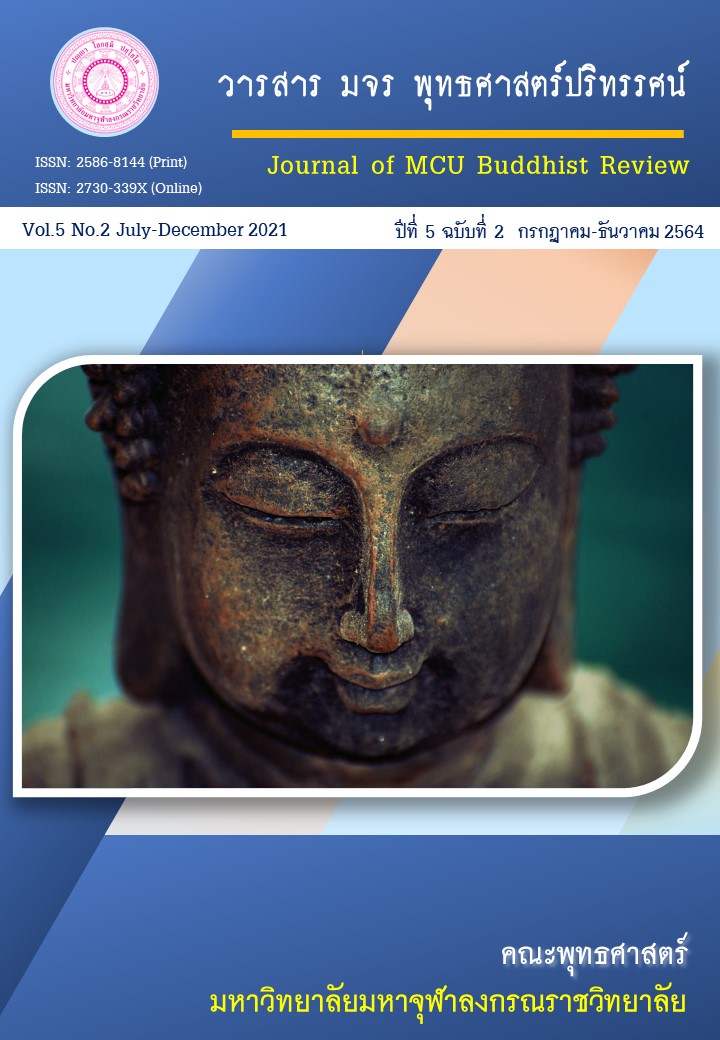รูปแบบความสัมพันธ์เชิงสาเหตุของปัจจัยทางจริยธรรมที่มีอิทธิพลต่อคุณลักษณะทางจริยธรรมนักศึกษาสื่อสารมวลชนตามกรอบมาตรฐานคุณวุฒิระดับอุดมศึกษาแห่งประเทศไทย
Main Article Content
บทคัดย่อ
การวิจัยนี้มีวัตถุประสงค์เพื่อพัฒนาและตรวจสอบความสอดคล้องของรูปแบบความสัมพันธ์เชิงสาเหตุของปัจจัยทางจริยธรรมมีอิทธิพลต่อคุณลักษณะทางจริยธรรมนักศึกษาสื่อสารมวลชนตามกรอบมาตรฐานคุณวุฒิระดับอุดมศึกษาแห่งประเทศไทย เป็นการวิจัยเชิงปริมาณ โดยใช้แบบสอบถามเป็นเครื่องมือในการเก็บรวบรวมข้อมูลจากกลุ่มตัวอย่างที่เป็นผู้ทำงานด้านสื่อสารมวลชน จำนวน 800 และทำการวิเคราะห์เส้นทาง (Part Analysis) ผลการวิจัยพบว่า รูปแบบความสัมพันธ์เชิงสาเหตุของปัจจัยที่มีอิทธิพลต่อคุณลักษณะทางจริยธรรมนักศึกษาสื่อสารมวลชนตามกรอบมาตรฐานคุณวุฒิระดับอุดมศึกษาแห่งประเทศไทย ไม่มีความกลมกลืนของข้อมูลเชิงประจักษ์ โดยการทดสอบไคว์-สแควร์ (Chi-square) มีนัยสำคัญทางสถิติที่ระดับ .01 (p=.000) เมื่อพิจารณาดัชนีกลุ่มที่กำหนดที่ระดับมากกว่าหรือเท่ากับ .90 พบว่า ดัชนีทุกตัวได้แก่ NFI = .945, IFI = .946 และ CFI = .946 ผ่านเกณฑ์ตามลำดับ ส่วนดัชนีที่กำหนดไว้ที่ระดับน้อยกว่า .05 พบว่า ดัชนี RMSEA = .292
Article Details
- บทความที่ได้รับการตีพิมพ์เป็นลิขสิทธิ์ของวารสาร มจร พุทธศาสตร์ปริทรรศน์
- ข้อความใดๆ ที่ปรากฎในบทความที่ได้รับการตีพิมพ์ในวารสาร ถือเป็นความรับผิดชอบของผู้เขียนบทความ และข้อคิดเห็นนั้นไม่ถือว่าเป็นทัศนะและความรับผิดชอบของกองบรรณาธิการวารสาร มจร พุทธศาสตร์ปริทรรศน์
เอกสารอ้างอิง
กิตติยา โสภณโภไคย. (2563). “คุณธรรม” “จริยธรรม” และการดำรงอยู่กับสังคมประชาธิปไตย (ความหมายและแนวคิดเชิงทฤษฎี.สืบค้นเมื่อ 27 มิถุนายน 2564 จาก https://www.ombudsman.go.th/10/ethical/ethical0.pdf
ดวงเดือน พันธุมนาวิน. (2543). ทฤษฎีต้นไม้จริยธรรม : การวิจัยและการพัฒนาบุคลากร. โครงการส่งเสริมเอกสารวิชาการคณะพัฒนาสังคม สถาบันบัณฑิตพัฒนบริหารศาสตร์.
นงค์นาถ ห่านวิไล. (2561). แนวทางการเสริมสร้างจริยธรรมสื่อมวลชนไทย เชิงพุทธบูรณาการ. วารสารร่มพฤกษ์ มหาวิทยาลัยเกริก. 36(1) มกราคม-เมษายน, 135-155.
นงนภัส พันธ์พลกฤต และ ฉัตรชัย ศิริกุลพันธ์. (2558). การพัฒนารูปแบบจิตจริยธรรมในการดำเนินชีวิตของนักศึกษาอาชีวศึกษาในจังหวัดเชียงใหม่. สาขาวิชาจิตวิทยา คณะมนุษยศาสตร์และสังคมศาสตร์ มหาวิทยาลัยพายัพ.
นารี น้อยจินดา. (2562). คุณธรรมจริยธรรมในสังคมไทย. วารสารวิชาการมหาวิทยาลัยรัตนบัณฑิต. 7(2) พฤศจิกายน 2555-เมษายน 2556, 55-62.
พรนิภา จันทร์น้อย. (2560). รูปแบบกจิกรรมการพัฒนาพฤติกรรมทางจริยธรรมของนักศึกษาในสถาบันอุดมศึกษาเอกชนตามคุณลกัษณะบัณฑิตอุดมคติไทย. วิทยานิพนธ์ตามหลักสูตรปรรัชญาดุษฎีบัณฑิต สาขาวชิาผู้นำทางการศึกษาและการพัฒนาทรัพยากรมนุษย์ บัณฑิตวิทยาลัย มหาวิทยาลัยราชภัฎเชียงใหม.
พระครูพิศาลจริยากร เลขธมฺโม (สังข์ขาว) และสุชน ประวัติดี. (2562). จริยธรรม: ปัญหาพฤติกรรมและการจัดการในปัจจุบันของสังคมไทย. วารสาร มจร มนุษยศาสตร์ปริทรรศน์. 5(2) กรกฎาคม-ธันวาคม 2562, 131-145
วีรวิท คงศักดิ์. (2563). จริยธรรมของสังคมไทย. สืบค้นเมื่อ 27 มิถุนายน 2564 จาก http://ndctt.org/home/images/DOC/Moralaty-Thai.pdf
สุคนธ์ธา เส็งเจริญ. (2556). การวิเคราะห์โครงสร้างความสัมพันธ์เชิงสาเหตุของปัจจัยที่มีอิทธิพลต่อจิตสำนึกสาธารณะในนิสิตระดับปริญญาตรี มหาวิทยาลัยศรีนครินทรวิโรฒ. วิทยานิพนธ์ปริญญาการศึกษามหาบัณฑิต สาขาวิชาการวิจัยและสถิติทางการศึกษา ภาควิชาการวัดและการวิจัยทางการศึกษา คณะศึกษาศาสตร์ มหาวิทยาลัยศรีนครินทรวิโรฒ.
สุทัศน์พงษ์ กุลบุตร. (2550). การปลูกฝังคุณธรรม จริยธรรมให้แก่นักศึกษา. ปทุมธานี : ศูนย์ศิลปวัฒนธรรม มหาวิทยาลัยศรีปทุม.
อำนวย ทองโปร่ง. (2560). การพัฒนาคนในระบบการจัดการศึกษา. วารสารดุษฎีบัณฑิตทางสังคมศาสตร์. 7(2) พฤษภาคม-สิงหาคม, 1-16.
Gardner, H. (2007). Five minds for the future. Boston: Harvard Business School Press.
Hair, J. F. et al. (2010). Multivariate Data Analysis: A Global Perspective. Retrieved on July 25, 2019, from http://staffweb.hkbu.edu.hk/vwschow/lectures/ism3620 /rule.pdf
Partnership for 21st Century skills. (2011). [online]. Framework for 21st Century Learning. Retrieved on July 25, 2019, http://www.p21.org/storage/ documents /1.__p21_framework_2-pager.pdf


